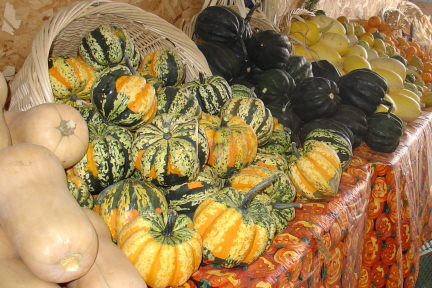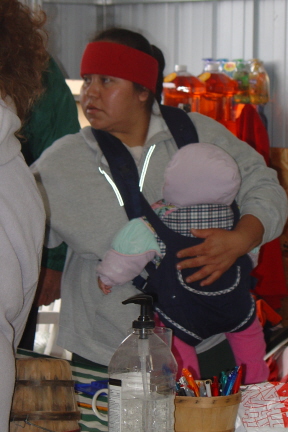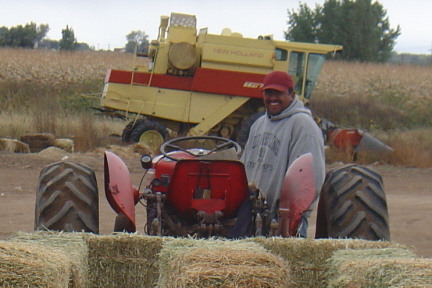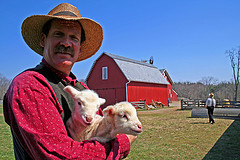« respect for english language learners |
Main
| *sigh* the rule of law »
October 6, 2006
the face of american farming

We recently spent a crisp fall morning at a nearby farm harvesting hundreds of pounds of produce. We were loaded onto hay wagons and towed around the fields in search of potatoes, carrots, beets, onions, etc. From the very start, I was having two separate experiences; two separate dialogues -- happy banter with my children and friends about every topic under the sun; thoughtful sidebars of conversation with my husband regarding the real story that day -- the story of the immigrant and American farming.

At the outset of our adventure, I found myself wandering through the farm's produce stand. There I saw this mother, stocking shelves and attending to visitors, with her tiny infant in tow. I'd been at this farm a few years back -- on an even colder day -- and in the same produce stand another woman was working, a toddler at her side. A shudder went through my spirit to see that these women seem to have no other option than to bring their little ones along as they work in the wind and chill. Posing as though I were delirious with the thrill of a harvest outing, I took pictures of the produce displays and then zoomed in to captured the image of the mother and child to share here.

Meandering toward the hay wagons, we passed an immigrant feeding the animals in the petting zoo while three more waited by the tractors that would pull us through the fields. Once we were loaded onto the wagons, we realized that among our group was a family of Eastern European immigrants. Elderly and middle aged ladies alike in their mismatched print skirts, sweaters, and headscarves. The men's faces rugged and timeworn. All held harvesting tools in gloved hands, it was obvious that they meant business -- they were there to harvest their maximum quota; to put up produce for the winter months. I enjoyed watching the cultural collisions as the farm workers tried to corral this group of very determined harvesters back onto the wagons when it was time to move along... "Amigos, we go now!" Sometimes slowly pulling away in order to gain their cooperation.
My husband wasted no time in befriending the farm workers and learned they had been at the farm for 6 years -- and were seemingly satisfied there -- but they had never been to the mountains, a mere 45 minute drive away. They lamented the fact that my husband had visited well known tourist attractions in their home town in Mexico -- places they had never had the opportunity to visit. Our new-found friends then started tipping us off to which area would have better harvesting -- seemingly to give us an advantage over the more serious harvesters in our group. Not that it was needed -- there was plenty for all.
In the ongoing conversation my husband and I shared, we observed that few people would think of an immigrant when asked what the American Farmer looks like. Images like this are more likely to spring to mind:

But it is an incomplete image at best. American Farming depends upon immigrant labor. Unfortunately, the media, politicians and the farming industry itself minimizes the contribution made by these immigrants. Although I exclusively saw immigrant workers on my two visits to Miller Farms, I was hard pressed to find evidence of immigrant workers on the farm's website. The only images I found were on the educational video where for a few seconds you will see a clip of workers with brown skin spreading seed with narration saying something to the effect of "Sometimes the farm workers help Farmer Joe."
Now, I'm all for Farmer Joe -- especially if he is providing fair wages and housing for his workers -- my point is that immigrants remain in the shadows largely because we keep them there -- for fear that acknowledging their contributions would diminish the American Fantasy.
Unfortunately for our farming industry, by keeping immigrants in the shadows, more than a fantasy is being shattered. From sea to shining sea agricultural profits are being shattered by the current farm worker shortage. Colorado's agricultural industry is set to lose millions this year because of a worker shortage prompted by the (most likely illegal) immigration laws passed in July.
As our harvest excursion drew to an end, the task of hauling our produce to the car loomed before us. Joking, my husband asked a teenage boy along on the outing how much he would charge to haul the bags to our car. He quipped, "$1,000 per bag." We all laughed. The truth is best spoken in jest.
And the truth is that you cannot pay an "American" worker to do these jobs.
Posted by almamia at October 6, 2006 9:22 AM
Comments
"Not that it was needed -- there was plenty for all."
There is the most important lesson of this story.
Posted by: Anna at October 6, 2006 4:09 PM